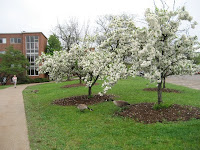For those of you attending the International Medieval Congress at Leeds this July, be sure to check out the sessions Medica is co-sponsoring with the Wellcome Trust this year:
Date: Tuesday, 12 July
Sponsor: Wellcome Trust / Medica: Society for the Study of Healing in the Middle Ages
Organizer: Iona McCleery, University of Leeds
I. Regimen for Rich and Poor (9:00-10:30 a.m.)
Moderator: Alex Bamji, University of Leeds
- Rich and Poor at the Hospital's Table: The Case of Nossa Senhora do Popolo, 1518-1580; Lisbeth de Oliveira Rodrigues, Instituto de Ciencias Sociais, Universidade do Minho
- Medieval Dietetic Instructions Found in the Cairo Genizah in Prescriptions from the Mediterranean Area; Efraim Lev, University of Haifa
- Applying Cultural Methods in Research of Medical History: Medieval Arab Medicine as a Case Study; Uri Mayer-Chissick, University of Haifa
II. Cooking Food for the Modern Public (11:15 a.m.-12:45 p.m.)
Moderator: Vicky Shearman, Clarke Hall Educational Museum, Wakefield
- Medieval Food"and Cookery from the Practical Standpoint of "Living History Displays" and "Real Meals for Real People"; Jenny Rogers, Independent Scholar, Perthshire and Julia Waugh, Independent Scholar, Spalding
- Engaging the Public in Healthy Eating through Bioarchaeology; Jo Buckberry, University of Bradford
- Experiments, Education, and Entertainment: The Opportunities and Problems with Historical Cookery Demonstrations at Historic Sites; Richard Fitch, Tudor Kitchen, Hampton Court Palace
- Was Medieval Food Healthy?: An Interdisciplinary Approach; Iona McCleery, University of Leeds
III. Feasting and Fasting (2:15-3:45 p.m.)
Moderator: Christopher Woolgar, Hartley Library/ Centre for Medieval & Renaissance Culture, University of Southampton
- Eating Like a King, a Saint, or a Horse: Food and Status in Anglo-Saxon England; Debby Banham, University of Cambridge
- Food for the Body, Sustenance for the Soul: A Stable Isotope Investigation of Diet at the Early Medieval Monastery at Tarbat, Scotland; Shirley Ann Curtis, University of Liverpool
- From Simnel to Horsebread: The Regulation of Bread for the Rich and Poor in Late Medieval England; Sarah Peters Kernan, Ohio State University
IV. Early Medieval Recipes: Theory and Practice (4:30-6:00 p.m.)
Moderator: Alaric Hall, University of Leeds
- Apicius: Aspects of the Incorporation of a Cookery Book in the Early Middle Ages, 8th and 9th Centuries; Wanessa Asfora, Centro Universitario Senac, Sao Paulo
- Rich Pickings from a Seeming Poverty of Evidence: Cuisine in the Eastern Empire; Timothy Dawson, Armley Mills, Leeds Museums & Galleries, Leeds City Council
- Feasting at Tintagel in the Late Saxon Period; Melanie Ezra-Logue, Independent Scholar, Truro and Daniel Ezra-Logue, Independent Scholar, Truro



